Projects worldwide
intec has executed and is implementing large and complex projects in nearly all regions of the world.
The projects listed on the website represent only a handful of our references.
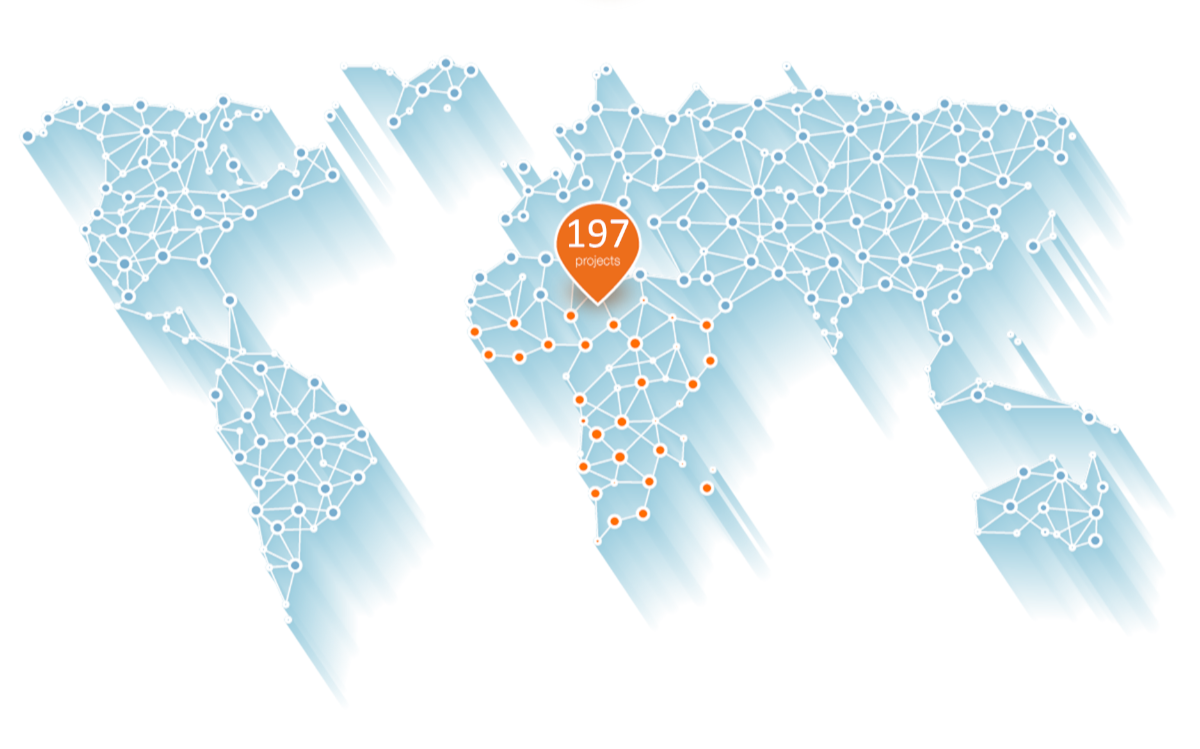
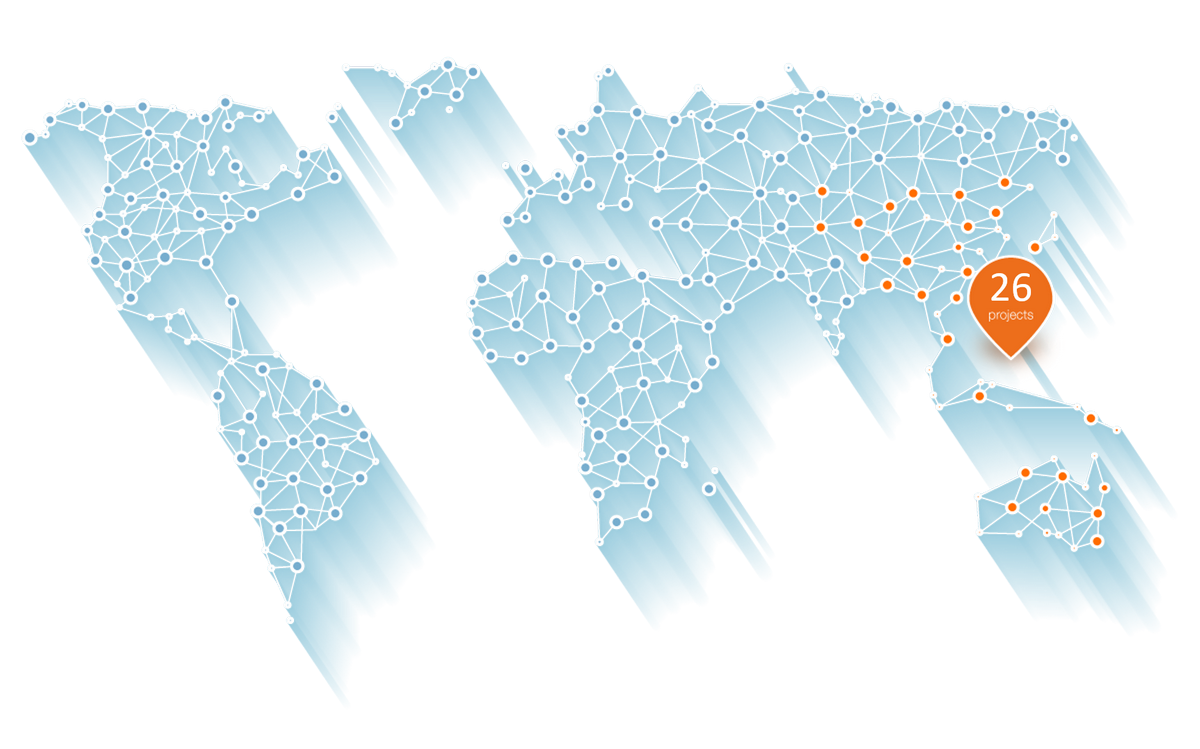
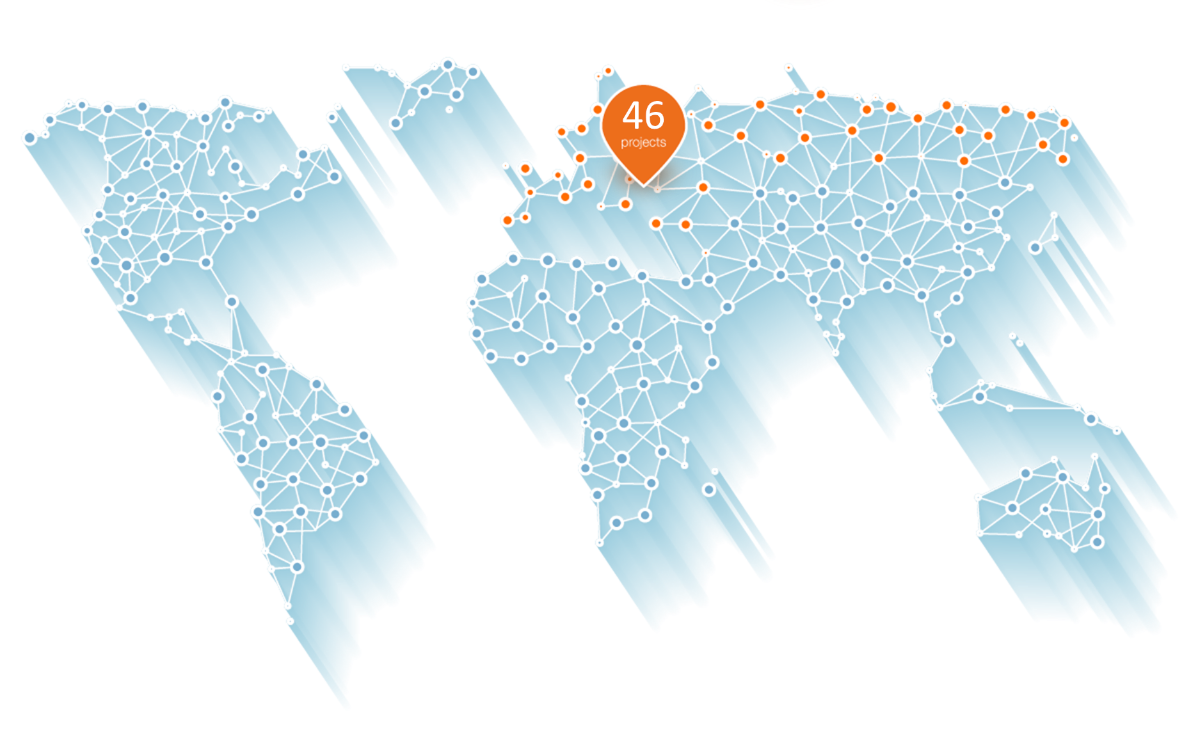
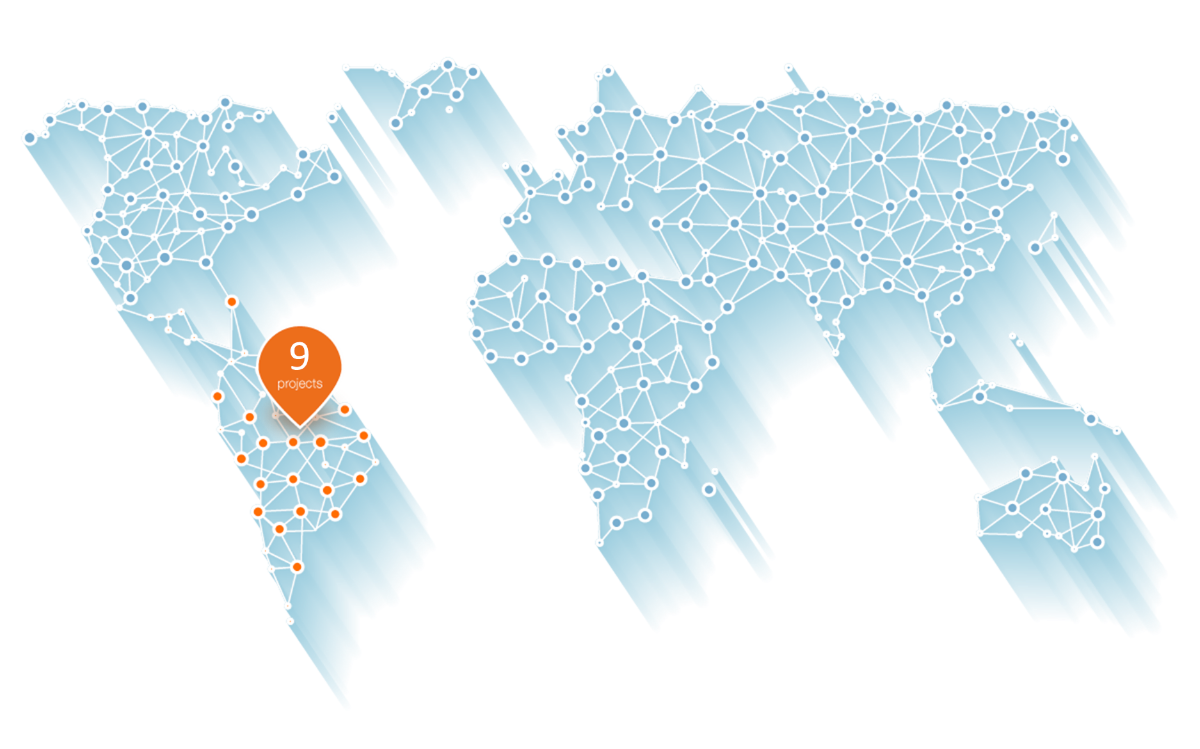
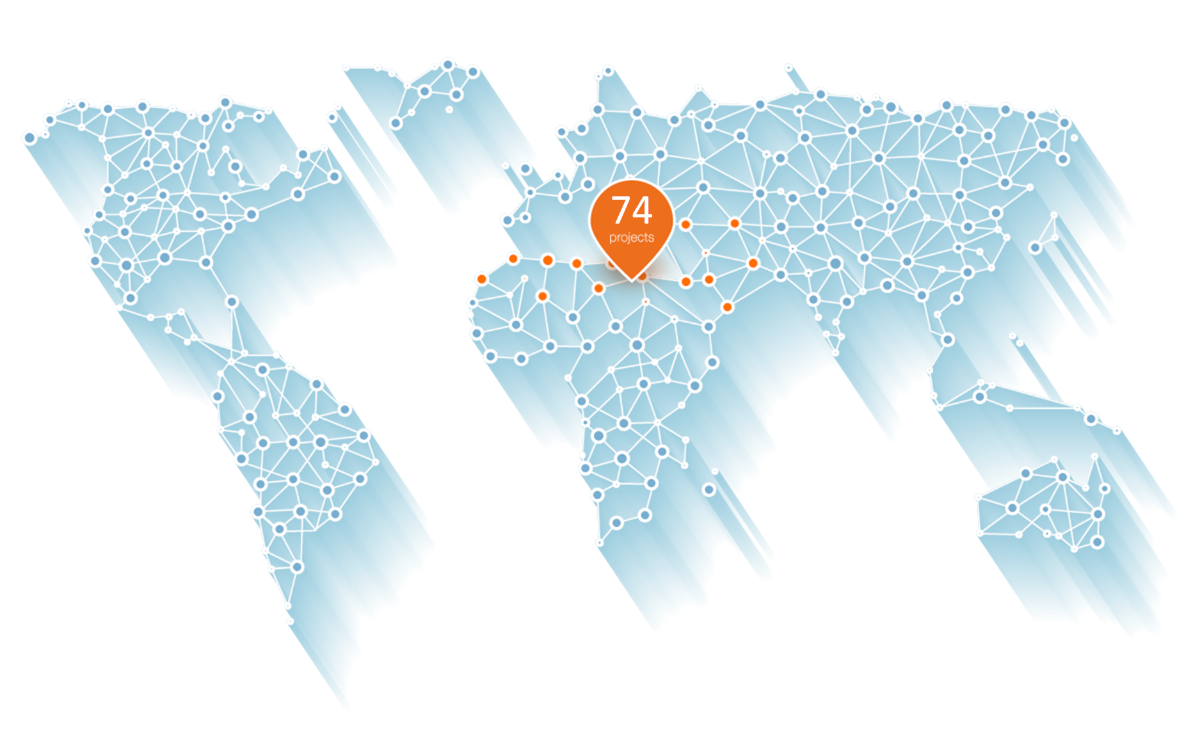

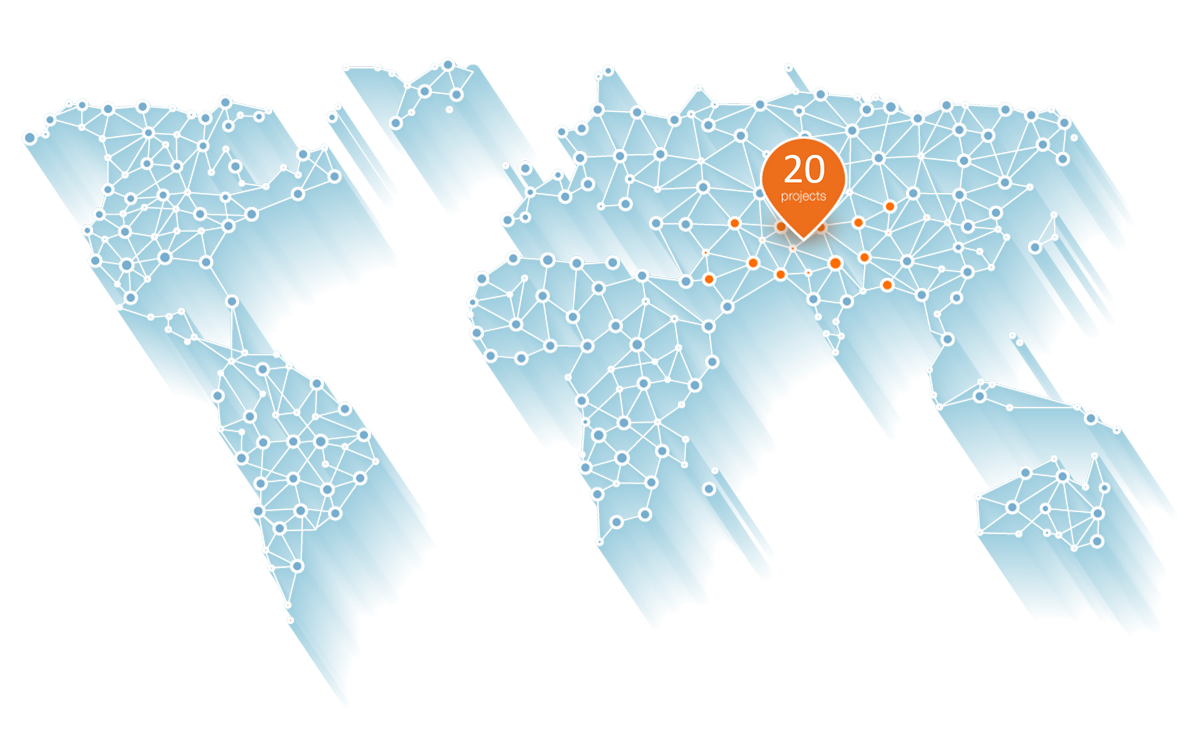
Our Projects
-
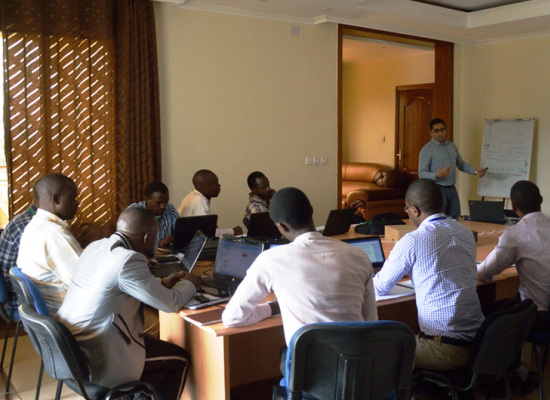
Rwanda - Capacity Building Programs and Technical Assistances to Strengthen the Energy Sector in Rwanda - "Scaling-up Energy Access Project"
To organize, provide and supervise a capacity building program (training, technical assistance, coaching, mentoring, etc.) for the energy sector in Rwanda, especially in the Ministry of Infrastructure (MININFRA), the Rwanda Energy Group (REG) and EARP (Electricity Access Roll-out Program PIU) to develop a strong sector management capacity (at individual, institutional and organizational level) and to improve these institutions’ investment planning, technical, operational, finance and support services functions. The capacity building programs will include advanced long-term, medium and short courses, which will be organized locally or abroad.
intec's services
- Capacity needs assessment of MININFRA, REG and EARP
- Organization, provision and supervision of an extensive training and capacity building program and provision of technical assistance.
Topics of the capacity building and training program include:
- Energy policy, strategy and management: Development of generation resource; renewable energy development; utility restructuring and best practice; regional projects and power pools; system operator and power trading; substation operation and maintenance; strategic planning and M&E,
- Energy development, investment and program implementation: Financial analysis, planning and modelling; bulk power generation and transmission network planning; investment planning and funding; IPP and PPPs, operations and management; asset management; project management; construction and contract management; procurement; environmental issues; monitoring and evaluation; project financial management; strategic maintenance planning, planning and design, GIS, load flows and load forecasting.
The technical assistance covers inter alia:
- Energy efficiency development programs; loss reduction in the electrical network; power trading; regional interconnection, energy planning strategy
Client
Energy Development Corporation Limited (EDCL)Financing
African Development Fund (AfDF)Period of implementation
2015 - 2017 -
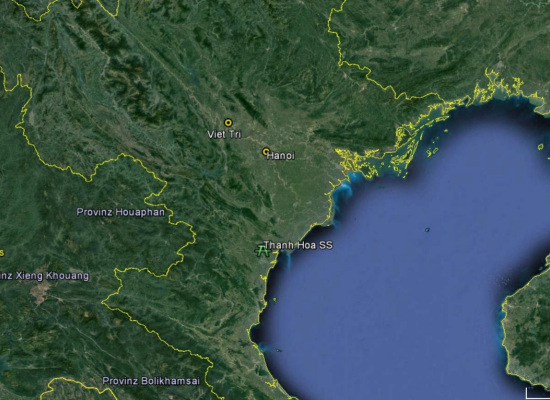
Vietnam - Smart Grid - Power Transmission Efficiency (Phase 1)
In 2011, the Vietnamese government approved the National Power Sector Development Masterplan VII (PDMP VII) and approved a number of power generation and transmission projects to be implemented between 2011 and 2020. German financial cooperation, via the KfW, contributes a loan for a 2-phase transmission efficiency project.
Phase 1 of this project covered six subprojects, three new 220 kV substations, and three new 220 kV transmission lines for which the Vietnam National Power Transmission Corporation (NPT) prepared feasibility studies and ESIAs.
The consultancy services contracted under this Phase 1 covered contract support to KfW in the preparation of the overall project.
intec's services
- Review of the subproject feasibility studies prepared by NPT and establishment of a summary report confirming technical/financial viability, describing risks and indicating possible gaps plus their remedies
- Site visits to all six subproject locations and mission reports
- Elaboration of project impact indicators, i.e. technical and non-technical losses, CO² reduction, technical availability of grid, etc. and establishment of a summary report
- Review of the subprojects' procurement plans, of cost estimates and time schedules, and elaboration of a consolidated procurement plan
- Identification and development of subprojects up to a total amount of approx. €100m to be implemented in Phase 2 of the project, with special focus on smart grid components, and compilation of related information in a final report
Client
KfW EntwicklungsbankFinancing
KfW EntwicklungsbankPeriod of implementation
04.2015 - 08.2017 -
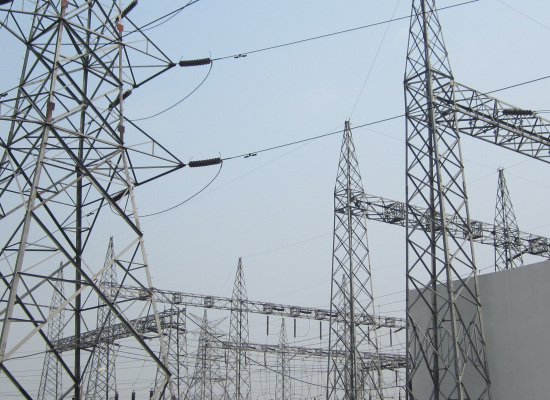
Bangladesh - Feasibility Study of the Transmission System Improvement, Western Zone
Bangladesh faces chronic power shortage with an estimated demand gap in the magnitude of 1900 MW and power outages in urban areas between 5-10 hours a day. Taking into account the demand forecast(s), the current load shedding and the extreme power shortage and operational constraints, PGCB launched the "Power Transmission Improvement Programme" and approached the Government for external sector assistance.
The project covers the following technical measures:- Construction of 132 kV double-circuit transmission lines and line in-/line outs to substations
- Stringing of a second circuit on an existing 132 kV line and installation of OPGW
- Construction of 230 kV double-circuit transmission lines and line-in/line-out to existing lines
- New construction of three 132/33 kV and one 230/132 kV substation
- Extension of a total of five 132/33 kV and one 230/132 kV substation (1 GIS substation)
intec's services
Feasibility study/technical and economic justification of the planned expansion measures, i.e.:
- Network analysis and update of load flow calculations
- Assessment of socio-economic benefits
- Preliminary line route identification
- Preliminary survey of substation areas
- Layout and design on feasibility level for the 230 and 132 kV lines, substations and substation extensions
- Identification of potential training needs in terms of O&M
- Cost estimate, economic and financial analysis of planned measures
- Initial Environmental Examination (IEE) and mitigation measures
- Detailed line route survey for 70 km of 230 DC line and a total of 85 km of 132 DC lines
- Full ESIA for the selected technical measures to be implemented and Environmental and Social Management Plan (ESMP)
Tendering of resulting first-priority measures, i.e.:
- Design and elaboration of technical specifications
- Determination of the bills of quantities
- Preparation of the tender dossiers (technical and commercial)
- Assistance during tendering
- Bid evaluation
- Assistance during contract negotiations
in total for six different tender packages (three substation packages and three transmission line packages).
Client
Power Grid Company of Bangladesh Ltd. (PGCB)Financing
KfW EntwicklungsbankPeriod of implementation
01.2014 - 07.2017
Rwanda - Capacity Building Programs and Technical Assistances to Strengthen the Energy Sector in Rwanda - "Scaling-up Energy Access Project"
To organize, provide and supervise a capacity building program (training, technical assistance, coaching, mentoring, etc.) for the energy sector in Rwanda, especially in the Ministry of Infrastructure (MININFRA), the Rwanda Energy Group (REG) and EARP (Electricity Access Roll-out Program PIU) to develop a strong sector management capacity (at individual, institutional and organizational level) and to improve these institutions’ investment planning, technical, operational, finance and support services functions. The capacity building programs will include advanced long-term, medium and short courses, which will be organized locally or abroad.
intec's services
- Capacity needs assessment of MININFRA, REG and EARP
- Organization, provision and supervision of an extensive training and capacity building program and provision of technical assistance.
Topics of the capacity building and training program include:
- Energy policy, strategy and management: Development of generation resource; renewable energy development; utility restructuring and best practice; regional projects and power pools; system operator and power trading; substation operation and maintenance; strategic planning and M&E,
- Energy development, investment and program implementation: Financial analysis, planning and modelling; bulk power generation and transmission network planning; investment planning and funding; IPP and PPPs, operations and management; asset management; project management; construction and contract management; procurement; environmental issues; monitoring and evaluation; project financial management; strategic maintenance planning, planning and design, GIS, load flows and load forecasting.
The technical assistance covers inter alia:
- Energy efficiency development programs; loss reduction in the electrical network; power trading; regional interconnection, energy planning strategy
Client
Energy Development Corporation Limited (EDCL)Financing
African Development Fund (AfDF)Period of implementation
2015 - 2017Vietnam - Smart Grid - Power Transmission Efficiency (Phase 1)
In 2011, the Vietnamese government approved the National Power Sector Development Masterplan VII (PDMP VII) and approved a number of power generation and transmission projects to be implemented between 2011 and 2020. German financial cooperation, via the KfW, contributes a loan for a 2-phase transmission efficiency project.
Phase 1 of this project covered six subprojects, three new 220 kV substations, and three new 220 kV transmission lines for which the Vietnam National Power Transmission Corporation (NPT) prepared feasibility studies and ESIAs.
The consultancy services contracted under this Phase 1 covered contract support to KfW in the preparation of the overall project.
intec's services
- Review of the subproject feasibility studies prepared by NPT and establishment of a summary report confirming technical/financial viability, describing risks and indicating possible gaps plus their remedies
- Site visits to all six subproject locations and mission reports
- Elaboration of project impact indicators, i.e. technical and non-technical losses, CO² reduction, technical availability of grid, etc. and establishment of a summary report
- Review of the subprojects' procurement plans, of cost estimates and time schedules, and elaboration of a consolidated procurement plan
- Identification and development of subprojects up to a total amount of approx. €100m to be implemented in Phase 2 of the project, with special focus on smart grid components, and compilation of related information in a final report
Client
KfW EntwicklungsbankFinancing
KfW EntwicklungsbankPeriod of implementation
04.2015 - 08.2017Bangladesh - Feasibility Study of the Transmission System Improvement, Western Zone
Bangladesh faces chronic power shortage with an estimated demand gap in the magnitude of 1900 MW and power outages in urban areas between 5-10 hours a day. Taking into account the demand forecast(s), the current load shedding and the extreme power shortage and operational constraints, PGCB launched the "Power Transmission Improvement Programme" and approached the Government for external sector assistance.
The project covers the following technical measures:
- Construction of 132 kV double-circuit transmission lines and line in-/line outs to substations
- Stringing of a second circuit on an existing 132 kV line and installation of OPGW
- Construction of 230 kV double-circuit transmission lines and line-in/line-out to existing lines
- New construction of three 132/33 kV and one 230/132 kV substation
- Extension of a total of five 132/33 kV and one 230/132 kV substation (1 GIS substation)
intec's services
Feasibility study/technical and economic justification of the planned expansion measures, i.e.:
- Network analysis and update of load flow calculations
- Assessment of socio-economic benefits
- Preliminary line route identification
- Preliminary survey of substation areas
- Layout and design on feasibility level for the 230 and 132 kV lines, substations and substation extensions
- Identification of potential training needs in terms of O&M
- Cost estimate, economic and financial analysis of planned measures
- Initial Environmental Examination (IEE) and mitigation measures
- Detailed line route survey for 70 km of 230 DC line and a total of 85 km of 132 DC lines
- Full ESIA for the selected technical measures to be implemented and Environmental and Social Management Plan (ESMP)
Tendering of resulting first-priority measures, i.e.:
- Design and elaboration of technical specifications
- Determination of the bills of quantities
- Preparation of the tender dossiers (technical and commercial)
- Assistance during tendering
- Bid evaluation
- Assistance during contract negotiations
in total for six different tender packages (three substation packages and three transmission line packages).
Client
Power Grid Company of Bangladesh Ltd. (PGCB)Financing
KfW EntwicklungsbankPeriod of implementation
01.2014 - 07.2017-
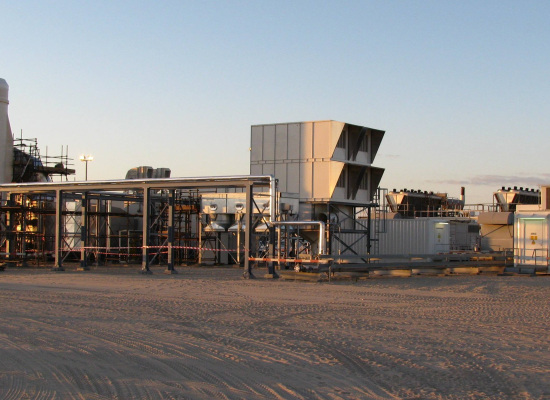
Mauritania - 50 MW Thermal Power Plant in Zouerate
SNIM (Société Nationale Industrielle et Minière) is a company that extracts the iron ore deposits around the mining city Zouerate, located in the Tiris Zemour region in the north of Mauritania. In order to cover its short-term electricity demand, M/s. SNIM commissioned TRACTEBEL ENGINEERING S.A. to carry out a feasibility study for a 50 MW thermal power plant in the city of Zouerate. The study on the generation units shall evaluate the following two variants:
- Conventional heavy fuel oil-fired generation units
- Dual fuel generation units running on heavy fuel oil and natural gas
Parts of the tasks under this feasibility study have been subcontracted to intec.
intec's services
intec contributed to the following tasks:
Phase 1: Analysis of the SNIM's electricity demand in the short, medium and long term, and definition of a medium and short-term supply strategy
- Site visit and data collection plus assessment of existing studies
- Demand analysis and energy balance
Phase 2: Study of the technology variants and dimensioning of production units (preliminary design)
- Analysis of advantages and disadvantages of each variant
- Proposal for a choice of technology and its justification
- Optimisation of generator unit dimensioning and cost estimates
Phase 3: Feasibility study for the chosen variant
- Site selection and climatic conditions
- Optimisation of nominal capacity of the single production units and determination of principal technical specifications
- Stability and operation analysis of SNIM's electricity network
- Analysis of the project’s technical and economic feasibility
- Environmental and Social Impact Assessment (ESIA)
- Geotechnical survey and laboratory analyses
- Detailed design study and elaboration of tender documents
Client
TRACTEBEL ENGINEERING S.A.Financing
TRACTEBEL ENGINEERING S.A.Period of implementation
08.2013 - 07.2016 -
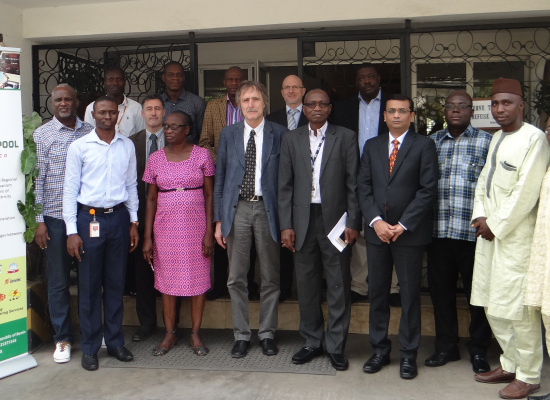
ECOWAS - Reduction of Distribution Losses in the Framework of the GIZ Project "Promoting a Climate-Friendly Interconnected Power System in West Africa"
ECOWAS, the Economic Community of West African states comprises 15 West African countries: Benin, Burkina Faso, Cabo Verde, Côte d'Ivoire, Gambia, Ghana, Guinea, Guinea-Bissau, Liberia, Mali, Niger, Nigeria, Senegal, Sierra Leone and Togo. The overall GIZ project supports the regional dissemination of experience concerning renewable energies and aims at improving the capacities of utilities in the long term. The "electricity distribution" part of the project, together with selected utilities, identifies options for the reduction of distribution losses, implements exemplary measures and disseminates the results in the region.
intec's services
- Task 1: Data collection, review and analysis of current situation in the member utilities: Diagnosis on the prac-tices of loss reduction, catalogue of good practices, proposal of related initiatives/projects for each utility, ex-amination of the adequacy of existing master plans in the distribution utilities and proposal of required updates including costs
- Task 2: Study to quantify system losses: Determination of loss levels by utility, estimate of share of technical losses, preparation of mitigation measures, review of / proposal for energy audit system for each utility, preparation of indicative plans and targets for capital expenditure to reduce overall losses possibly to below 10%
- Task 3: Loss reduction investment plans and cost estimates: development and recommendation of a comprehensive short- and long-term loss reduction investment plan including costs, recommendation of technical measures such as norms, standards and loss management guidelines
- Task 4: Training and capacity building: training needs assessment of utility staff, recommendations for capacity building programs in line with WAPP's capacity building program for member utilities and in coordination with GIZ's capacity building activities of the overall project.
Client
Deutsche Gesellschaft für Internationale Zusammenarbeit (GIZ) GmbHFinancing
Deutsche Gesellschaft für Internationale Zusammenarbeit (GIZ) GmbHPeriod of implementation
04.2015 - 07.2017 -
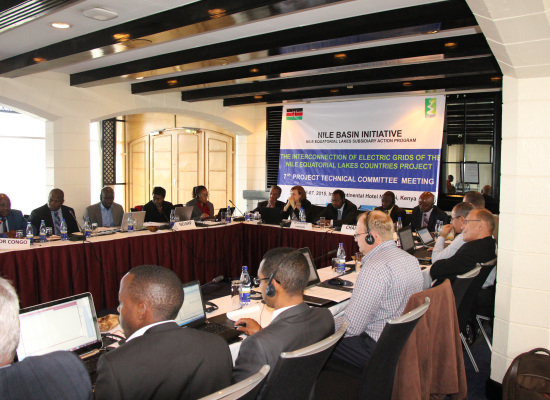
D.R. of the Congo - Revision of Environmental and Social Studies
The 220 kV Kamanyola - Buhandahanda line shall evacuate the electricity generated by the Ruzizi III Hydropower Plant which is part of the 220 kV interconnected network of the CEPGL (Communauté Economique des Pays des Grands Lacs - Economic Community of the Great Lake Countries). Studies for this line were finalised in September 2011 and shall be revised under the present project with the aim to take into consideration the new locations of the Kamanyola and Buhandahanda Substations and the new line concept.
intec's services
The following E&S services were carried out in the framework of the for the project “220 kV Line Kamanyola – Buhandahanda”:
Environmental and social impact assessment (ESIA)
Initial Environmental and Social Study (physical and biological environment):
- Desktop studies
- Field study
- Social features (population, demography, cultural heritage, historical resources, landscape and tourism, infrastructure, education, land use, employment, industrialisation, agriculture and fisheries, local health)
- Impact identification and evaluation
- Proposal of mitigation measures
- Stakeholder identification and consultation (local authorities, NGO’s local population) – public hearings
Environmental and social management plan (ESMP):
- Identification and proposal of measures and actions to mitigate the negative impacts of the project
- Evaluation of the costs for the implementation of the impact mitigation measures
- Propose the institutional framework for the measures and actions to be put in practice
- Propose the timeline for actions/measures to be implemented
Resettlement action plan (RAP):
- Review of the legal framework with regards to land acquisition and forced resettlement
- Goods inventory (census)
- Check if the expropriation measures are in line with national regulations as well as with the international good practices
- Proposal of socio-economic measures for compensation or acquisition
- Propose the grievance mechanism to be implemented to solve potential conflicts
- Propose the budget for implementing all the measures
Organisation of a validation seminar with EGL, SNEL (National Power Company of Congo), the Steering Committee and KfW
Client
Energie des Grands Lacs - EGLFinancing
Kreditanstalt für Wiederaufbau (KfW)Period of implementation
07.2015 - 03.2017
Mauritania - 50 MW Thermal Power Plant in Zouerate
SNIM (Société Nationale Industrielle et Minière) is a company that extracts the iron ore deposits around the mining city Zouerate, located in the Tiris Zemour region in the north of Mauritania. In order to cover its short-term electricity demand, M/s. SNIM commissioned TRACTEBEL ENGINEERING S.A. to carry out a feasibility study for a 50 MW thermal power plant in the city of Zouerate. The study on the generation units shall evaluate the following two variants:
- Conventional heavy fuel oil-fired generation units
- Dual fuel generation units running on heavy fuel oil and natural gas
Parts of the tasks under this feasibility study have been subcontracted to intec.
intec's services
intec contributed to the following tasks:
Phase 1: Analysis of the SNIM's electricity demand in the short, medium and long term, and definition of a medium and short-term supply strategy
- Site visit and data collection plus assessment of existing studies
- Demand analysis and energy balance
Phase 2: Study of the technology variants and dimensioning of production units (preliminary design)
- Analysis of advantages and disadvantages of each variant
- Proposal for a choice of technology and its justification
- Optimisation of generator unit dimensioning and cost estimates
Phase 3: Feasibility study for the chosen variant
- Site selection and climatic conditions
- Optimisation of nominal capacity of the single production units and determination of principal technical specifications
- Stability and operation analysis of SNIM's electricity network
- Analysis of the project’s technical and economic feasibility
- Environmental and Social Impact Assessment (ESIA)
- Geotechnical survey and laboratory analyses
- Detailed design study and elaboration of tender documents
Client
TRACTEBEL ENGINEERING S.A.Financing
TRACTEBEL ENGINEERING S.A.Period of implementation
08.2013 - 07.2016ECOWAS - Reduction of Distribution Losses in the Framework of the GIZ Project "Promoting a Climate-Friendly Interconnected Power System in West Africa"
ECOWAS, the Economic Community of West African states comprises 15 West African countries: Benin, Burkina Faso, Cabo Verde, Côte d'Ivoire, Gambia, Ghana, Guinea, Guinea-Bissau, Liberia, Mali, Niger, Nigeria, Senegal, Sierra Leone and Togo. The overall GIZ project supports the regional dissemination of experience concerning renewable energies and aims at improving the capacities of utilities in the long term. The "electricity distribution" part of the project, together with selected utilities, identifies options for the reduction of distribution losses, implements exemplary measures and disseminates the results in the region.
intec's services
- Task 1: Data collection, review and analysis of current situation in the member utilities: Diagnosis on the prac-tices of loss reduction, catalogue of good practices, proposal of related initiatives/projects for each utility, ex-amination of the adequacy of existing master plans in the distribution utilities and proposal of required updates including costs
- Task 2: Study to quantify system losses: Determination of loss levels by utility, estimate of share of technical losses, preparation of mitigation measures, review of / proposal for energy audit system for each utility, preparation of indicative plans and targets for capital expenditure to reduce overall losses possibly to below 10%
- Task 3: Loss reduction investment plans and cost estimates: development and recommendation of a comprehensive short- and long-term loss reduction investment plan including costs, recommendation of technical measures such as norms, standards and loss management guidelines
- Task 4: Training and capacity building: training needs assessment of utility staff, recommendations for capacity building programs in line with WAPP's capacity building program for member utilities and in coordination with GIZ's capacity building activities of the overall project.
Client
Deutsche Gesellschaft für Internationale Zusammenarbeit (GIZ) GmbHFinancing
Deutsche Gesellschaft für Internationale Zusammenarbeit (GIZ) GmbHPeriod of implementation
04.2015 - 07.2017D.R. of the Congo - Revision of Environmental and Social Studies
The 220 kV Kamanyola - Buhandahanda line shall evacuate the electricity generated by the Ruzizi III Hydropower Plant which is part of the 220 kV interconnected network of the CEPGL (Communauté Economique des Pays des Grands Lacs - Economic Community of the Great Lake Countries). Studies for this line were finalised in September 2011 and shall be revised under the present project with the aim to take into consideration the new locations of the Kamanyola and Buhandahanda Substations and the new line concept.
intec's services
The following E&S services were carried out in the framework of the for the project “220 kV Line Kamanyola – Buhandahanda”:
Environmental and social impact assessment (ESIA)
Initial Environmental and Social Study (physical and biological environment):
- Desktop studies
- Field study
- Social features (population, demography, cultural heritage, historical resources, landscape and tourism, infrastructure, education, land use, employment, industrialisation, agriculture and fisheries, local health)
- Impact identification and evaluation
- Proposal of mitigation measures
- Stakeholder identification and consultation (local authorities, NGO’s local population) – public hearings
Environmental and social management plan (ESMP):
- Identification and proposal of measures and actions to mitigate the negative impacts of the project
- Evaluation of the costs for the implementation of the impact mitigation measures
- Propose the institutional framework for the measures and actions to be put in practice
- Propose the timeline for actions/measures to be implemented
Resettlement action plan (RAP):
- Review of the legal framework with regards to land acquisition and forced resettlement
- Goods inventory (census)
- Check if the expropriation measures are in line with national regulations as well as with the international good practices
- Proposal of socio-economic measures for compensation or acquisition
- Propose the grievance mechanism to be implemented to solve potential conflicts
- Propose the budget for implementing all the measures
Organisation of a validation seminar with EGL, SNEL (National Power Company of Congo), the Steering Committee and KfW

